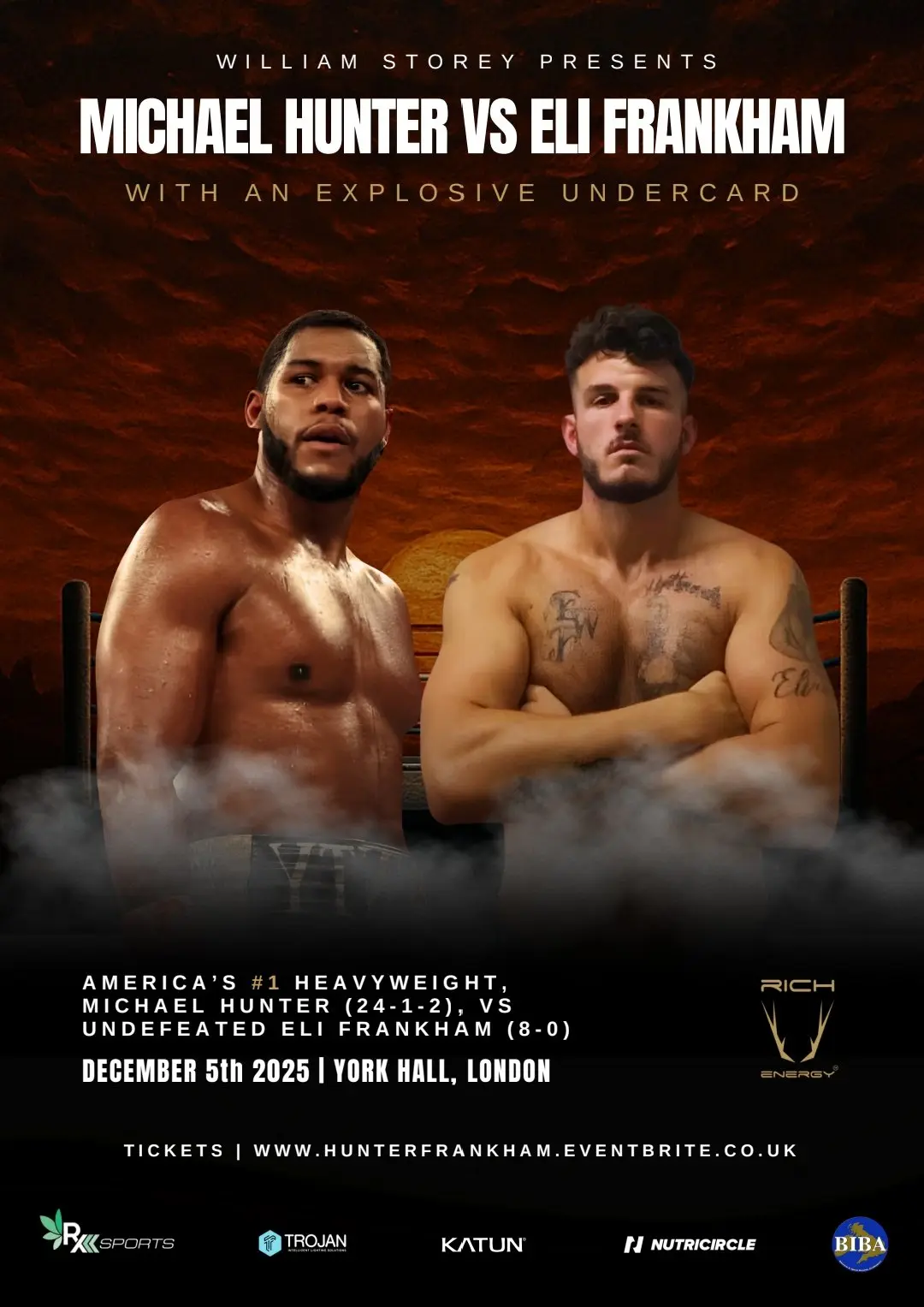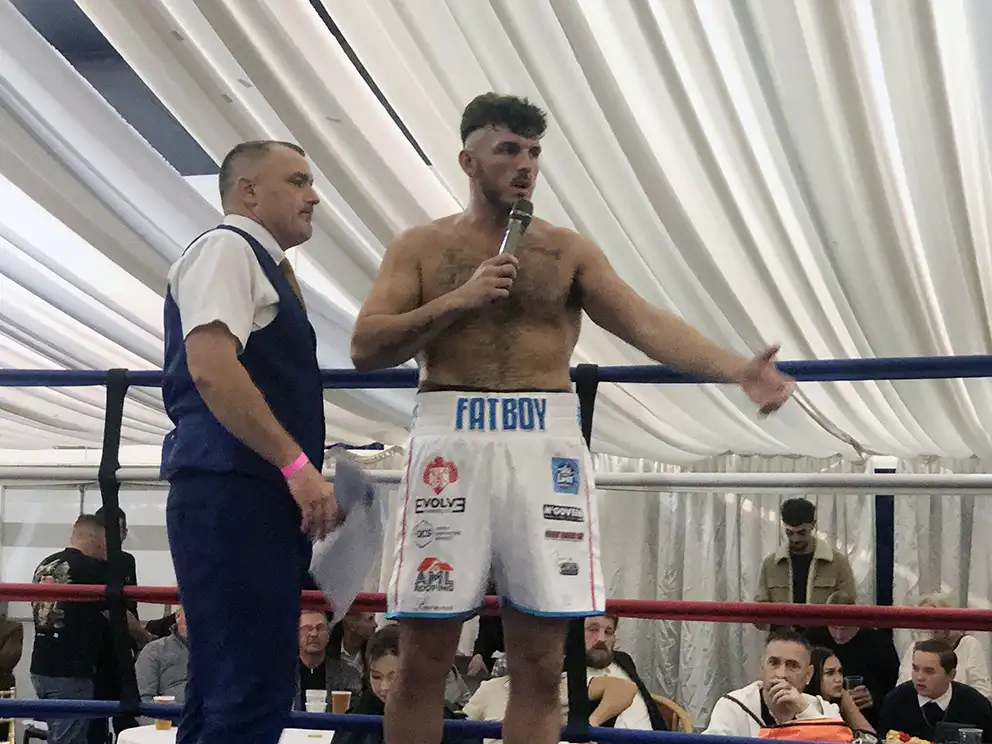Heavyweight Boxing
London, England, UK - Michael Hunter’s career has never followed a straight line. At times, he’s looked like the most dangerous heavyweight on earth who nobody wanted to fight. At others, he’s slipped into the sport’s shadows, boxed in odd places, and drifted through months of uncertainty. Now, on December 5 at York Hall in London, Hunter returns again—this time against unbeaten small-hall heavyweight Eli “Fatboy” Frankham in a matchup that raises eyebrows for all the predictable reasons.

Frankham is undefeated. He’s game. He’s earnest. But he is not on Hunter’s level, and everyone around the sport knows it. This matchup isn’t about competitive parity. It’s about Hunter staying active while his larger career keeps stalling, zig-zagging, and looping in circles just as bigger moments seem within reach.
Still, York Hall is York Hall. And boxing’s small rooms have their own mythology. On December 5, a world-class fighter steps into a place built for nights like this, carrying the weight of a career too talented to be this complicated.

When Michael Hunter faced Oleksandr Usyk in 2017 for the WBO cruiserweight title, he gave the Ukrainian southpaw one of the tougher nights of his championship run. He lost, but his stock rose. He moved to heavyweight, and for a moment, everything clicked.
He stopped the unbeaten Martin Bakole in 2018.
He dominated the unbeaten Sergey Kuzmin in 2019.
He held Alexander Povetkin to a draw in a fight many felt he won.
He looked like that guy—the American dark horse who could outbox anyone.
But everything after 2019 felt off rhythm. Hunter fought sporadically, negotiated endlessly, and slipped between promoters and sanctioning bodies. A heavyweight with world-class ability found himself boxing in Mexico, on IBA shows, and on cards that never quite matched his résumé.
In 2025 alone, Hunter was lined up:
Every time a major fight rose into view, something undercut it.
Now he’s fighting a man whose official global record is three bouts.
It’s very on brand for the modern Michael Hunter story.
The promotional posters list Eli Frankham at 9–0 (6 KOs). That number is technically true—within the BIBA structure.
Globally recognized records, like those kept by BoxRec, list him at 3–0 (0 KOs) with a five-year gap of inactivity.
The missing fights weren’t faked; they were fought on the small-hall circuit under the British & Irish Boxing Authority, a body outside the British Boxing Board of Control ecosystem. That means the bouts don’t populate the major global databases, and they don’t influence world rankings.
Frankham is 32, from Wisbech, and built like a rugged cruiser-heavy fighter who punches hard and fights with pride. He comes from a fighting family, had a decorated schoolboy amateur career, and returned to boxing after personal setbacks, including time served and long stretches out of the ring.
His last year has been a feel-good run through small-town venues, late-notice replacements, and local acclaim. He has heart. He has bravery. And he is absolutely sincere about this opportunity.
But none of that changes the essential question:
No.
Not remotely.
This is not a competitive matchup on paper. And Frankham himself, to his credit, doesn’t pretend otherwise. He calls this a moment he has worked for his entire life. He is grateful. He is realistic. And he is stepping into a ring with a man who has fought—and beaten—fighters from a different universe.
There are mismatches, and then there are gulf-level separations.
Hunter is:
Frankham has:
If Hunter is himself, this fight will not be close. It will not be competitive. The challenge isn’t Frankham; it’s whether Hunter chooses to treat the night as a showcase, a tune-up, or a statement.
The only way Frankham makes this fight interesting is if Hunter completely underestimates the moment, falls asleep at the wheel, or turns the bout into an unnecessary sparring session.
If Hunter applies pressure and lets his hands go, the gulf shows immediately.
This bout exists because Hunter needs activity.
He has been out of rhythm for years. Big fights keep evaporating. Sanctioning bodies lose patience. Promoters move on. And every time an opportunity appears, the chain of events seems to twist.
A York Hall headliner doesn’t make sense for a man who once pushed Usyk, beat Bakole, and boxed at world contender level.
But it makes perfect sense for a man whose career has taken every unpredictable detour imaginable.
Hunter could be one win away from something big. Or he could be one canceled fight away from vanishing into another year of limbo. That volatility is part of the intrigue.
The bout will be officiated by a full international panel:
For Hunter, this is familiar territory with credible officials.
For Frankham, it’s the biggest night of his life.
York Hall has seen world champions rise, fall, and revive themselves. It has also hosted many evenings where local fighters dared to dream bigger than anyone expected. The venue suits both men for different reasons, even if their boxing realities exist on opposite ends of the spectrum.
Frankham’s comments are heartfelt, and they matter.
He acknowledges:
He’s not pretending he’s the favorite.
He’s not pretending he’s world-level.
He’s fighting because this is the moment he has chased since childhood.
Respect belongs to the man for getting here at all.
For Hunter, the task is different.
He doesn’t need a story.
He needs clarity.
He needs to show:
If Hunter looks flat, unmotivated, or careless, it will raise questions. If he looks sharp and decisive, it immediately strengthens his position heading into 2026.
Hunter is too good to be floating at this level. The only way back to meaningful fights is to remind people why he was once seen as the most dangerous outsider in the division.
For Frankham, the goal isn’t victory.
The goal is dignity, resistance, and visibility.
He needs to:
If he can extend this fight even modestly, he will elevate his standing in the domestic scene.
Boxing history is full of fighters who lost their first big step up but gained respect in the process. Frankham’s best hope is to be one of them.
Michael Hunter by early, emphatic stoppage.
A mid-round KO is the most likely scenario, but if Hunter decides to press for a message-making finish, this could end inside the first three rounds.
It would take a once-in-a-generation upset for this fight to go the other way.
This isn’t a competitive matchup, but it is a meaningful one for two very different reasons:
One man is maintaining relevance.
The other is chasing a dream.
York Hall has space for both stories.
But only one of them leaves the ring on December 5 with his career trajectory intact.
Update: Michael Hunter scored a 5th round TKO.